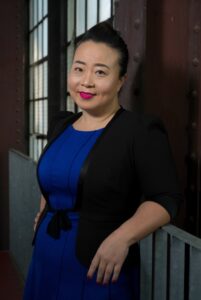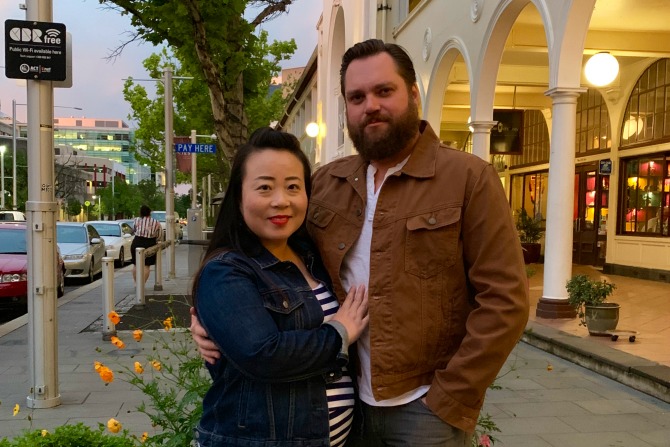Today marks International Pregnancy and Infant Loss Remembrance Day. ACT Opposition Leader Elizabeth Lee reveals her private and most recent pain.
How do you say goodbye to someone you have never met?
They say one in four pregnancies end in miscarriage. And they say this statistic is probably conservative because some miscarriages occur early in the term before some realise they were even pregnant.
It is a unique loss to grieve for someone you have never met but it is a painful reality that affects so many families.
Everyone deals with loss in their own way and a pregnancy or early infant loss would be the no different.
My partner, Nathan, and I experienced a miscarriage in June 2018. Like many women, I did not realise I was pregnant until I was in the midst of a miscarriage.

Elizabeth Lee. Picture: Martin Ollman
I still remember the next few days desperately trying to hold on to something I knew was already slipping away. I was on the Estimates Committee of the Assembly and was in the midst of 15 days of public hearings.
Cramping, nausea, headaches, bleeding…and despite every effort, the morning I woke up my sheets soaked in blood; rushing to Emergency in sheer desperation…I knew deep down that we had lost our baby.
It’s amazing where your mind goes when you find out you’re pregnant. I know it was silly but within the first 24 hours I had already started a short list of names, thought about whether they would look more like me or more like Nathan, what school they might go to, how I could teach them Korean…
In the aftermath of the miscarriage, despite knowing there was nothing I could have done, I couldn’t help but think about what I could have done to prevent the loss. Was it that winery tour I went on the weekend before I found out I was pregnant? Was it the high impact gym class I did earlier that week?
And whilst Nathan and I were very lucky to fall pregnant again fairly quickly after our miscarriage, I know that many families are not so lucky.
The stigma, guilt and loneliness that comes with experiencing a loss like this is all too common in our society. And for women from a culturally and linguistically diverse (CALD) background, the added shame makes it yet another reason to not speak up.
Our daughter, Mia, is now a thriving, cheeky, strong-willed two-year-old and brings us joy, love and laughter in ways that I could never have imagined.
As the oldest of three girls with a close relationship to my sisters, I always knew that I wanted Mia to experience the same love and closeness that I had. I always knew that when Mia was born, I wanted at least another child.
The odds were always against me, having had Mia (my first child) two months before I turned 40 but I knew I would regret it my whole life if I did not at least give it another shot.
The most painful of words—“I’m sorry, there’s no heartbeat”
And, against the odds, I found out I was pregnant again at the beginning of this year.
Excited that this new baby would have just over two years age gap with Mia and that I was able to get pregnant, the discussion quickly turned to which room will the new baby get? How do we prepare Mia to get ready to welcome a new sibling? And, given the COVID world we are living in, were we going to be allowed our parents to visit the hospital?
At our first scan, we heard those dreaded (almost cliché) words, “I’m sorry, there’s no heartbeat.”
A completely different experience to the first miscarriage where I woke up to sheets soaked in blood. Thinking back on it now, over the last few days my pregnancy symptoms had eased (the nausea had disappeared and I felt less bloated) but I had never really had much nausea when I was pregnant with Mia so I had sort of dismissed it.
A dilation and curettage and a long weekend to recover. The physical recovery was fine (as medical procedures go, a D & C is fairly straightforward) and even emotionally, I was holding up okay. I told myself it can happen of course (I knew the stats). And I got pretty good at compartmentalising this experience as a one-off.
We were lucky that two months later, I fell pregnant again. I was a little surprised but delighted that it happened so quickly and I was fortunate to have good support from my medical team.
The first scan, I held my breath as the sonographer had trouble picking up the foetal heartbeat. The silence (which I’m sure was only for a few minutes) felt like hours as I convinced myself that every tiny movement on the blurry image was a heartbeat.
Finally, as I was bracing myself for those dreaded words, “I’m sorry, there’s no heartbeat”, a smile: “Here we go; there’s the heartbeat. All looks good.”
Given my previous experience and my age, my OB asked me to see him in a week’s time so that we could keep an eye on things. At the appointment when he had trouble locating the heartbeat, he referred me to another ultrasound so the heavy-duty machine could confirm foetal growth.
The familiar room; the familiar sonographer; the familiar jelly on my stomach…
This time, in what seemed to be the first minute, those dreaded words, “I’m sorry, there’s no heartbeat.”
As I wiped the jelly off my stomach, walked out to reception where they told us there was no fee for this ultrasound and drove back home, the shock of the news started to hit home. Another D & C and again, no issues with the physical recovery but this time, somehow, I couldn’t bring myself to get out of bed that weekend.
It’s an emptiness that’s hard to describe. It’s not like I went into a deep dark place of overwhelming grief; but it hits me when I least expect it. It’s the Facebook memory that pops up on my feed with a picture of Mia’s ultrasound, the fuzzy photo clearly showing her cute little side profile. It’s when I’m updating my health insurance policy and they innocently ask, “Do you need top hospital cover?” It’s when people ask, in a well-meaning way, “Are you going to have another baby?”
We’re not alone
The experiences of many, many families are different yet it binds us together in our grief, loss and an overwhelming sense of loneliness.
15 October has been recognised internationally as Pregnancy and Infant Loss Remembrance Day for some time and in February this year, the Australian federal Parliament also recognised it as such, calling on action to reduce the number of pregnancy and infant loss in Australia.
And on 8 October this year, the ACT Legislative Assembly unanimously passed a motion for the ACT to formally recognise 15 October as Pregnancy and Infant Loss Remembrance Day after a motion was co-sponsored by Shane Rattenbury MLA, Leader of the ACT Greens, Tara Cheyne MLA, ACT Minister for Human Rights, and myself, as Leader of the Canberra Liberals.
The debate was emotionally charged and we also learn about the personal pain of loss from Members including Rebecca Vassarotti MLA and Andrew Braddock MLA. The amazing courage and heart of Australians like John and Kate De’Laney from WA who heartbreakingly lost seven babies and started their journey of raising awareness of pregnancy and infant loss from 2013; and Canberrans Bonnie and Steve Carter who farewelled two girls before welcoming their beautiful Evie just six months ago—have put their own grief aside to make sure that no other Australian family goes through this devastation alone.
Whilst our motion does not bring back our lost babies or reduce the losses in itself, it is an important gesture from those who have the privilege of being the voice of our community to stand up with all the families that have experienced pregnancy and infant loss because they are not alone.
We are not alone.
This article was originally published on HerCanberra. Read the original here.
BroadAgenda is a proud supporter and partner of HerCanberra.
Elizabeth Lee, MLA is Assistant Speaker, Shadow Minister for Education, Shadow Minister for Disability, Shadow Minister for the Environment and Member for Kurrajong in the ACT Legislative Assembly. Elizabeth migrated to Australia from South Korea in 1986 when she was seven years old. She moved to Canberra at 18 to study Law and Asian Studies at the ANU. Elizabeth has practised law in government and the private sector and lectured in law at the ANU and University of Canberra.





